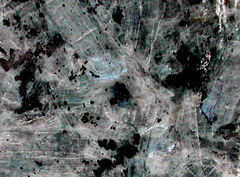Labradorescence
| Labradorite | |
|---|---|

Labradorite in a polished rock slab
|
|
| General | |
| Category | Feldspar, tectosilicate |
|
Formula (repeating unit) |
(Ca,Na)(Al,Si)4O8, where Ca/(Ca + Na) (% anorthite) is between 50%–70% |
| Crystal system | Triclinic |
| Crystal class | Pinacoidal (1) (same H-M symbol) |
| Unit cell | a = 8.155 Å, b = 12.84 Å c = 10.16 Å; α = 93.5° β = 116.25°, γ = 89.133°; Z = 6 |
| Identification | |
| Color | Gray, brown, greenish, blue, yellow, colorless |
| Crystal habit | Crystals typically thin and tabular, rhombic in cross section, striated; massive |
| Twinning | Common by Albite, Pericline, Carlsbad, Baveno, or Manebach twin laws |
| Cleavage | Perfect on {001}, less perfect on {010}, intersecting at near 90°; distinct on {110} |
| Fracture | Uneven to conchoidal |
| Mohs scale hardness | 6 – 6.5 |
| Luster | Vitreous to pearly on cleavages |
| Streak | white |
| Diaphaneity | Translucent to transparent |
| Specific gravity | 2.68 to 2.72 |
| Optical properties | Biaxial (+) |
| Refractive index | nα = 1.554 - 1.563 nβ = 1.559 - 1.568 nγ = 1.562 - 1.573 |
| Birefringence | δ = 0.008 - 0.010 |
| 2V angle | Measured: 85° |
| Dispersion | None |
| Other characteristics | Labradorescence (iridescent) |
| References | |
Labradorite ((Ca, Na)(Al, Si)4O8), a feldspar mineral, is an intermediate to calcic member of the plagioclase series. It has an anorthite percentage (%An) of between 50 and 70. The specific gravity ranges from 2.68 to 2.72. The streak is white, like most silicates. The refractive index ranges from 1.559 to 1.573. Twinning is common. As with all plagioclase members, the crystal system is triclinic, and three directions of cleavage are present, two of which are nearly at right angles and are more obvious, being of good to perfect quality. (The third direction is poor.) It occurs as clear, white to gray, blocky to lath shaped grains in common mafic igneous rocks such as basalt and gabbro, as well as in anorthosites.
The geological type area for labradorite is Paul's Island near the town of Nain in Labrador, Canada. It has also been reported in Norway and various other locations worldwide.
Labradorite occurs in mafic igneous rocks and is the feldspar variety most common in basalt and gabbro. The uncommon anorthosite bodies are composed almost entirely of labradorite. It also is found in metamorphic amphibolites and as a detrital component of some sediments. Common mineral associates in igneous rocks include olivine, pyroxenes, amphiboles and magnetite.
...
Wikipedia
